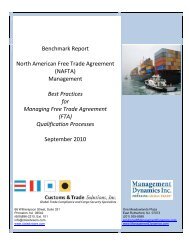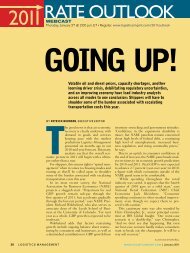Download - Logistics Management
Download - Logistics Management
Download - Logistics Management
You also want an ePaper? Increase the reach of your titles
YUMPU automatically turns print PDFs into web optimized ePapers that Google loves.
2012 SUPPLY CHAIN VIRTUAL CONFERENCE<br />
Now ON-DEMAND @ logisticsmgmt.com/global2012<br />
“ What’s happened is that<br />
we have a collaborative<br />
mentality among the<br />
carriers. They realize that<br />
if they compete for market<br />
share they will trigger a<br />
price war, so everybody has<br />
been trying to avoid that.”<br />
—David Jacoby,<br />
Boston Strategies International<br />
ocean miles. Despite this ongoing challenge,<br />
David Jacoby, president of Boston<br />
Strategies International, says that<br />
the “collaborative approach” to ocean<br />
carriage is worth the trouble it takes to<br />
set up such arrangements.<br />
Designed to facilitate better communication<br />
and understanding on the high<br />
seas, collaborative ocean shipping benefits<br />
all parties and ensures a smoother,<br />
more streamlined global supply chain.<br />
And while repairing their bottom lines<br />
has become a top priority for the world’s<br />
ocean carriers, leading industry analysts<br />
contend that they’re also looking to<br />
restore customer relationships over the<br />
coming year.<br />
To do this, carriers are now initiating<br />
their own analytics designed to measure<br />
on-time reliability to create more<br />
transparency, accountability, and comparability—and<br />
shippers are responding<br />
favorably by working these metrics<br />
into their contracts.<br />
To introduce his session, Jacoby<br />
points out that as traffic volume continues<br />
to slow, overall imports were up<br />
7 percent to 10 percent over the previous<br />
few months as a result of the peak.<br />
However, he adds, West Coast imports<br />
were up only 0.7 percent between<br />
January and August of 2012. The net<br />
trade balance will improve temporarily<br />
as imports fall, says Jacoby, and the<br />
growth of exports and imports “is very<br />
close to a wash, which means that the<br />
government policy was effective.”<br />
However, spending patterns will<br />
resume a strong import trend by the<br />
third quarter of 2013, Jacoby predicts,<br />
thus keeping the trade balance structurally<br />
negative. As these and other<br />
global and domestic trends continue<br />
to affect shippers, ocean shipping<br />
movements, and rates, Jacoby says<br />
that working through the issues will<br />
require a more collaborative approach<br />
to the process.<br />
“What’s happened is that we have<br />
kind of a collaborative mentality among<br />
the carriers,” says Jacoby. “They realize<br />
that if they compete for market share<br />
they will trigger a price war, so everybody<br />
has been trying to avoid that.” <br />
Global Port Tracker report points to deep<br />
European recession<br />
The most recent edition of the Global Port Tracker report from Hackett Associates<br />
and the Bremen Institute of Shipping Economics and <strong>Logistics</strong> suggests<br />
that the logistics landscape in Europe will continue to be a puzzle.<br />
Stagnant and sluggish economic conditions, including declining consumer<br />
confidence, high unemployment, and tight fiscal policy, among others, continue<br />
to paint a dark picture of the European economic outlook.<br />
This continued weakness in the European economies confirms that the<br />
recession is here and will continue to have an impact on trade flows over the<br />
coming six months,” said Ben Hackett, president of Hackett Associates, in the<br />
report. “Looking forward into 2013 does not provide for much optimism. Our<br />
model suggests the recovery will not come before 2014.”<br />
The report stated that total European volumes are projected to drop 9.3<br />
percent over the next six months, compared to a 6.7 percent decline for the<br />
same period a year ago. And imports are projected to decline 11.9 percent and<br />
exports are projected to decline 4.7 percent for the same period. For all of 2012,<br />
the report expects to see a 3.9 percent in total imports.<br />
And for the six European ports surveyed in the report, that it’s projecting<br />
imports to decline by 2.8 percent in 2012, with exports projected<br />
to grow 3.6 percent. Total handled volumes for 2012—at 39.99<br />
million TEU—would represent a modest 0.2 percent gain.<br />
—Jeff Berman, Group News Editor<br />
88 LOGISTICS MANAGEMENT WWW.LOGISTICSMGMT.COM | December 2012

















